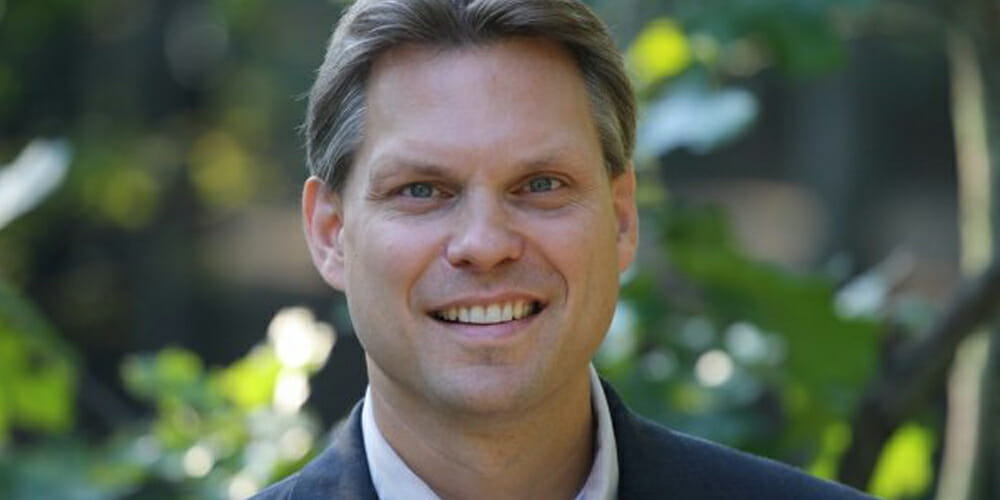A pastor shares his testimony with Spring Meeting attendees

Note: During each Spring Meeting and Annual Council of the General Conference Executive Committee, time is set aside for personal testimonies addressing the question, “Who Are We and Why Are We Here?” Below is the testimony given at the 2018 Spring Meeting. Elements of the oral style have been retained.
My testimony is certainly not the most exciting, but I’m honored to have the privilege of sharing it today. Who are we and why are we here? That’s a broad question, but today, perhaps I can share with you a little about who I am and why I’m here.
My parents were converts to Adventism, and when I was a little boy we went to Sabbath School and church. But when I was nine years old, our family moved from Ohio to Missouri and my parents simply stopped taking us to church.
The reasons were complicated. My mom and dad had both gone through difficult divorces while still young and while attending the same church. I came along at a challenging time, when they and their children were attempting to merge two Adventist families into one—and there was plenty of anger, hurt, blame, and guilt to go around.
At the same time, my dad had been influenced by some of the teachings of Desmond Ford. Perhaps Dr. Ford didn’t intend for his teachings to lead to this, but my dad started feeling free from the “do’s and dont’s” of religion and decided salvation and true righteousness by faith didn’t require him and mom to go to church anymore. So, we didn’t. They threw away all their little red books (Ellen White) and spoke disparagingly of an unforgiving church where their closest friends were not nearly as accepting as the new ones they were making in the world.
Conversations About God
I don’t remember much about that time. I was nine years old, and I loved my mom, and was very close to my dad. It was all fine with me. So, I grew up not talking about God. From the time I was nine until I was 22, I can only recall two significant conversations about God.
One was while drinking with my public high school buddies. A couple of them were atheists, but I still believed there was a God. My argument was that there had to be a God, because we’re all basically good people. Which is, of course, the opposite of what the Bible says. I was falsely ascribing the voice of conscience to my own nature. I remember thinking while arguing with my friends, I sure hope they don’t ask me to back up anything I’m saying with the Bible, because I have no clue about what it says.
The other conversation I remember from those days was with my older brother. He was nine years older than me, so he had gone to an Adventist academy. I remember him saying that he felt God would give everyone a chance—no one would be lost without being given an opportunity to know and follow Him. My mind was spinning, and I said, “Do you think THIS is my opportunity?” I was worried about my eternal destiny and wondered if this conversation would be my last chance. But I was a teenager, and I let time pass.
Eventually my parents returned to Ohio to care for their aging parents while I remained in Missouri, living in a house with my closest friends and attending the University of Missouri. An unusual series of events led to me having two knee surgeries and a tonsillectomy in one semester. I was unable to work and pay my rent, and living in a party house with four other guys was not the best place to heal from my ailments. My mother finally convinced me to move back to Ohio and transfer schools by telling me that my credits would transfer. It was like death to me to leave behind my friends of so many years, but I knew I needed a new start.
A New Start
It was during that time, while attending The Ohio State University and living in the basement of my parent’s house—far from the influence of my worldly friends—that I began to think about who I was, and what I wanted.
As a professed Christian who didn’t know anything about the Bible, I had always felt that I should at least gain a little knowledge of what’s in there so that I wouldn’t look silly if someone asked me. So, at the age of 22, I wrote down on my to-do list: do your laundry, study for your test, clean up your room, read your Bible. In the basement of my parent’s house, I picked up a Bible and began to read, and the course of my life was changed forever
No pastor or Bible worker came to my door, and I didn’t know what an evangelistic campaign was—though I do believe in Bible workers and evangelistic campaigns. But at that point in my life, it was just me and the Bible.
I can’t tell you exactly where I started reading, but I can tell you this—I knew it was true. It cut right through all the pretense and pride of my heart and spoke so clearly and truthfully. It was so clearly divine. As the officers sent to take Jesus said, “Never man spake like this Man.”
My dad suffered from a severe case of rheumatoid arthritis, and by this time he was confined to his bed for most of the day. He and mom stayed in separate rooms because he was in a lot of pain and up most of the night.
I remember going upstairs to my dad’s room after reading my Bible for a while and saying to him, “If this is all true, what are we all doing here?” As if to say, “This life is temporary. Eternal life is in the balance. Why is nobody in my life talking about this!?”
Powerful Truth
Two things were revealed to me forcefully in those few weeks of earnest study of the Bible: (1) What the Bible says about eternal realities is powerfully true; and (2) The Lord Jesus Christ is the Savior I’d always needed but never knew I did.
All my life I’d been trying to gain the favor of friends and classmates by my words, choices, and actions—never finding true acceptance or approval. And here was Jesus, pursuing me and shining His favor on me in spite of my words, choices, and actions. I was gripped, overwhelmed—and to be honest, caught by surprise—as the Savior of the world wrapped His glory around a wretch like me. I wept and wept in those early days.
The inspired words from Steps to Christ would later be among my favorites: “Jesus loves to have us come to Him just as we are, sinful, helpless, dependent. We may come with all our weakness, our folly, our sinfulness, and fall at His feet in penitence. It is His glory to encircle us in the arms of His love and to bind up our wounds, to cleanse us from all impurity” (p. 52).
I still need that glory today. It was His glory—it was His joy—it was what He most wanted to do and what made His noble character shine so bright, in contrast to my selfish heart. I was the reason that He gave His life.
Suddenly, my feelings of insecurity that caused me to strive in vain for the approval of others seemed so unimportant. The Son of God knew me, understood me, and had chosen me—and if the Son of God is on your side, how could the opinion of mortals affect you? I related strongly to passages such as 1 Corinthians 1:26-29:
“For you see your calling, brethren, that not many wise according to the flesh, not many mighty, not many noble, are called. But God has chosen the foolish things of the world to put to shame the wise, and God has chosen the weak things of the world to put to shame the things which are mighty; and the base (insignificant) things of the world and the things which are despised God has chosen…”
And Romans 8:31-34: “What then shall we say to these things? If God is for us, who can be against us?”
My best friend from grade school through college called to speak to me, and my dad filled him in about the change that was happening with me. When I took the phone, I was met with sarcastic and mocking words, “So, I heard you found Jesus!”
I tried using words to explain what had happened to me, but I quickly learned that truly knowing Jesus only comes by revelation—and only to those ready to hear Him. Before long, my lifestyle would no longer match that of my dearest childhood and young adult friends, and my decision to follow Christ would eventually create a painful separation that still hurts today.
Visiting Church
Amazingly, however, at the same time I was going through this, two of my brothers were opening up to the truth also, and we asked our dad if he would take us to church. At this point in his life, my father was feeling some regret for having not taught his kids anything about God, and so he took us to church.
He may have left Adventism, but he still believed that the seventh day was the Sabbath. So, he took us to the nearest Adventist Church. As it turned out, the nearest church to us was not a traditional church, but a “mission” church. It was intended as an outreach to burned out Adventists. As it turned out, some of its leaders were apparently the ones burned out on Adventism—burned out on Christian standards, burned out on Ellen White, and burned out on typical views of Adventist prophecy.
I didn’t know the first thing about any of that, other than that I wasn’t sure I wanted to be an Adventist—or at least the kind of Adventist that my parents spoke so negatively about through the years.
I remember going to a youth event in those days, and the speaker asked what the young people thought about the standards of the church. One well meaning, raised-in-the-church kind of fellow from Dayton spoke up and said that we don’t do those things to be saved, but we do them because we are saved. I didn’t like his answer. So, I raised my hand, stood up, and said, “If you’re telling me that if I eat meat, which I do, and if I drink coffee, which I do, and if I wear jewelry [as I pulled out my cross necklace], which I do… that I can’t have a relationship with Jesus—then you’re wrong!”
Of course, no one was saying I couldn’t have a relationship with Jesus, but the defensiveness in my tone was palpable. The truth is I’d never studied into any of those things. I was rejecting them based on stubbornness, selfish desires, and the ingrained bias of my parents. It would be a while before Jesus softened my heart and I saw the Adventist lifestyle as a wonderful gift from God—something better than the world offers. At the time, my pride wouldn’t let me.
Jubilee Charts and Moral Influence Theory
And the church I was attending didn’t exactly set me straight. Instead, I was introduced to a host of views that I had to wrestle through. When I started attending, many of the members were studying a prophecy guru who showed cool jubilee charts culminating in a major event—presumably the second coming—that was to take place in 1994. From others in that church we were taught the moral influence theory, though they didn’t call it that, and that God never destroys. Still others taught that a personal relationship with God is one in which He talks to you directly—unencumbered by the Bible.
But a small breakthrough happened when two young men came to our area who traveled to various places to present Week of Prayer programs. They came to our house on Sabbath afternoon and give us Bible studies using a white board. I now know that there were some serious errors in what they taught, but there were positives, too. They described a beautiful picture of the character of God, then handed us the book Desire of Ages, or Patriarchs and Prophets, and have us read highlighted paragraphs from those books.
Power of Prophecy
The words were incredible. The same eternal quality and divine ring of truth that cut through my heart when reading the Bible—was in these books. For the first time since my parents had thrown away all those little red books, it brought my defenses down about Ellen White. My brothers and I began to read the Spirit of Prophecy. We began to read the writings of the pioneers and Jones and Waggoner. And we met a pastor at our first camp meeting who taught a class on the sanctuary that affirmed the unique place of Adventism in prophetic history.
For the first time I was learning about the prophetic rise of the Seventh-day Adventist Church, and it was all so unbelievable. The study of prophecy had not really appealed to me when all I knew was complicated jubilee charts—but now I was learning something that was so clear, so powerfully persuasive, so incredibly affirming, that I could not believe that people would ever leave it for confusing jubilee charts!
The parallels in the chapters of Daniel 2, 7, and 8 were so clear. And Daniel 8:14 was not “an island text,” as Dr. Ford had said. It was about the Day of Atonement in Leviticus 16, when the High Priest came before the Ark in the earthly Most Holy Place to cleanse, or make atonement, for the sanctuary. And Daniel 7 was a perfect parallel, with the Son of Man (High Priest) coming before the Ancient of Days for judgment (before the Ark) in heaven’s Most Holy Place.
I wondered how anyone could not see it! And Malachi, Habakkuk, and Psalm 73, in addition to Daniel 7 and 8, all pointed to a consistent biblical pattern— (1) the prospering of the wicked— (2) followed by judgment— (3) out of the sanctuary. It was powerful!
Then, Daniel 12 paired with Revelation 10 totally blew me away. In Daniel 12 a mighty messenger raises his hands to heaven and swears by Him who lives forever that Daniel’s prophecies would be sealed for a time, times, and half a time. Since we know this to be the 1260-year period that ends in 1798, we would expect new understandings of Daniel to open up after 1798.
And that’s exactly what happened. Right after 1798, in the Advent Movement of the early to mid-1800’s, an intense study of the book of Daniel opened up new light and understanding about the 2300 days—exactly like the prophecy had predicted!
Then in Revelation 10, it portrays the whole thing! The same imagery is seen—a mighty messenger raising his hand to heaven and swearing by Him who lives forever. But this time He’s not declaring that Daniel’s prophecies are sealed, but revealing that they’re open!
John then represents the church when he takes this little open book, symbolizing new understandings of the prophecies of Daniel culminating in the hopeful expectation of 1844—and he eats it. At first, it’s sweet because God’s people were filled with joy when they believed Jesus would return in 1844. But then it turns bitter, because they were met with the Great Disappointment.
The Church of Prophecy
You can’t make this stuff up. It’s incredible! After the confusing stuff I had studied, I could not believe it. I hadn’t seen the history of the birth of other denominations outlined in Scripture, but here was the Adventist Church—right there in the Bible!
In Revelation 10, the Advent believers received the mandate to “prophesy again” and to take the message to the whole world! We know that the Bible says the gospel will go to the whole world and then the end will come. But Revelation 14 explains that the gospel that brings about the end is the unique message of the Seventh-day Adventist Church! It includes the message that judgment has already arrived, a call to worship the Creator with a clear reference to the Sabbath, a restoration of truths that were obscured by Babylon, and a final message of mercy and warning to the world to keep all the commandments of God by faith in the righteousness of Christ, rather than following the maxims and traditions of men.
Nothing short of this message will bring about the end prophesied in Revelation 14:14, when one like the Son of Man comes with a sharp sickle to reap the harvest of the earth.
In my early experience of knowing Christ as my personal Savior, our prophetic message was instrumental in providing anchors for my faith. The true meaning behind the dates and symbols of prophecy gave me even greater confidence in Christ and the Bible—and they gave me clarity of purpose. A life mission, if you will.
Restoring Truth
One more thing that struck me from our prophetic message that I’ll share with you was when I realized that the judgment was not the only thing that began in 1844. You see, Daniel 8 says that Rome, in its papal phase, would cast truth to the ground (Daniel 8:12). It says he would cause deceit, or error, to prosper (Daniel 8:25).
Truths about salvation, about the law of God, about the character of God and man, and so much more—were covered up and lost sight of during those dark years. But right after saying that the truth had been cast to the ground, the question is asked, “How long will the vision be?”
Now there’s a lot in that question, but one aspect of that question is, “How long will error prosper and these truths be hidden and cast to the ground?” And the answer came, “Unto 2300 days, then shall the sanctuary be cleansed.”
It then dawned on me—part of the work of our Great High Priest in cleansing the sanctuary was to restore the truths that had been so long cast to the ground. And what would God do at the end of the 2300 days—in 1844—to restore those truths?
He would raise up the movement that would become the Seventh-day Adventist Church. He would restore His law by shining a light into the Most Holy Place and restore the gift of prophecy at the same time by giving young Ellen Harmon her first vision in December of 1844. The law and the prophets working together to guide a church destined to restore truth to the world in preparation for the second coming of Christ!
What I learned in those early days and years, was that the Seventh-day Adventist Church is not just a church that teaches a unique view of prophecy. The Seventh-day Adventist Church was predicted and born out of Bible prophecy—its history, its rise, and its message, are all traced in the very pages of the prophetic Scriptures. It was raised up by God, it belongs to God, and its future is in the hands of God.
My father passed away in 2003, and I still miss sitting across from his bed and talking to him about the most important things in my life. He never re-joined the Adventist Church, but he loved and actively served God in his later years, visiting nursing homes every day in his electric wheelchair to bring cheer to those who had no one to visit them. When I consider the mind-altering steroids and other pain killers he was prescribed for 25 years, I’m trusting his eternity to the righteous judge who knows all things. I’m happy to tell you that my mother made an entire change in her life, and today, as she has been for many years, Mom is an active Seventh-day Adventist who loves God and her church. She gave birth to five boys, and all five of us are today baptized and active Seventh-day Adventists.
So perhaps now you know a little more about me, and about the Savior who chooses insignificant people like me and uses us in spite of ourselves, and about the incredible mission and message traced out in Scripture for this glorious remnant, who keep the commandments of God and have the faith of Jesus. Thank you so much for this opportunity, and may God bless each of you.








